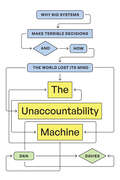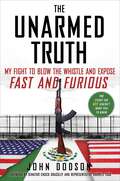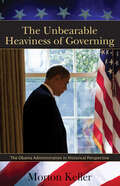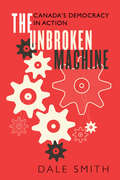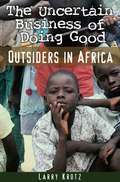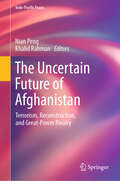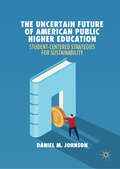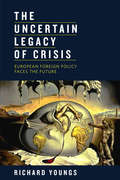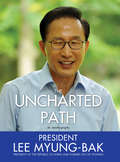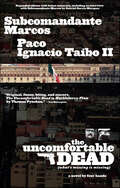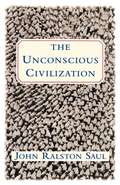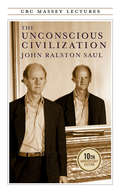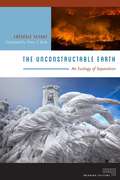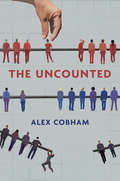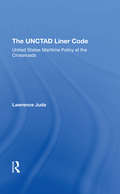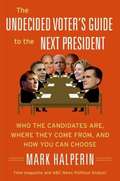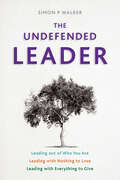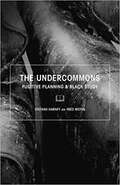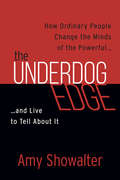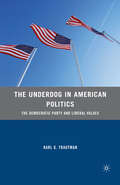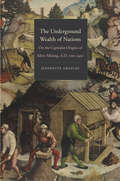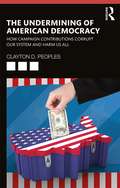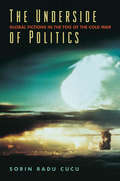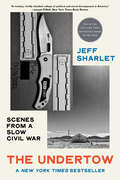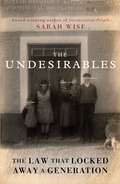- Table View
- List View
The Unaccountability Machine: Why Big Systems Make Terrible Decisions—and How the World Lost Its Mind
by Dan DaviesLonglisted for the 2024 Financial Times Book of the Year. How life and the economy became a black box—a collection of systems no one understands, producing outcomes no one likes. Passengers get bumped from flights. Phone menus disconnect. Automated financial trades produce market collapse. Of all the challenges in modern life, some of the most vexing come from our relationships with automation: a large system does us wrong, and there’s nothing we can do about it. The problem, economist Dan Davies shows, is accountability sinks: systems in which decisions are delegated to a complex rule book or set of standard procedures, making it impossible to identify the source of mistakes when they happen. In our increasingly unhuman world—lives dominated by algorithms, artificial intelligence, and large organizations—these accountability sinks produce more than just aggravation. They make life and economy unknowable—a black box for no reason. In The Unaccountability Machine, Davies lays bare how markets, institutions, and even governments systematically generate outcomes that no one—not even those involved in making them—seems to want. Since the earliest days of the computer age, theorists have foreseen the dangers of complex systems without personal accountability. In response, British business scholar Stafford Beer developed an accountability-first approach to management called “cybernetics,” which might have taken off had his biggest client (the Chilean government) not fallen to a bloody coup in 1973. With his signature blend of economic and journalistic rigor, Davies examines what’s gone wrong since Beer, including what might have been had the world embraced cybernetics when it had the chance. The Unaccountability Machine is a revelatory and resonant account of how modern life became predisposed to dysfunction.
The Unarmed Truth: My Fight to Blow the Whistle and Expose Fast and Furious
by John DodsonA hard-hitting inside account of the Fast and Furious scandal—the government-sponsored program intended to “win the drug war” by providing and tracking gun sales across the border to Mexico—from whistle-blower and ATF agent John Dodson.After the terror attacks of September 11, 2001, John Dodson pulled bodies out of the wreckage at the Pentagon. In 2007, following the shooting massacre at Virginia Tech, John Dodson walked through the classrooms, heartbroken, to cover up the bodies of the victims. Then came Arizona. The American border. Ten days before Christmas, 2010, ATF agent John Dodson awoke to the news he had dreaded every day as a member of the elite team called the Group VII Strike Force: a U.S. border patrol agent named Brian Terry had been shot dead by bandits armed with guns that had been supplied to them by ATF. Was this an inevitable consequence of the Obama administration’s Project Gunrunner, set in place one year earlier ostensibly to track Mexican drug cartels? Brian Terry’s murder would not only change John Dodson’s life forever; it would reveal a scandal so unthinkably unpatriotic that it forced President Barack Obama to claim executive privilege and caused Attorney General Eric Holder to be held in contempt of Congress. Federal Agent John Dodson, an ex-military man, took an oath to defend the world’s greatest country, and proudly considered himself a walking patriotic example of the American Dream. Brian Terry, ex-military like Dodson, was only forty years old, a family man who served his country by working for the government. Dodson was terrified when the next phone call came, one with the potential to destroy his career, his family, and his life. CBS investigative journalist Sharyl Attkisson asked Dodson to go public with what he knew about Fast and Furious. To Agent Dodson, this meant blowing the whistle. But to the family of Agent Terry, it was a chance to save lives and right a wrong. As he took a fight from the border towns of Arizona to a showdown in the halls of Congress, John Dodson clung to the hope that truth would prevail, that he would be redeemed, and that Brian Terry’s death would not be in vain. Like whistle-blowers before him, John would not be welcome back on the job. But he found strength in his conscience, in the support of the American public, and in Senators Darryl Issa and Chuck Grassley. When his first-amendment rights to publicly tell his story were threatened, the ACLU took up his case. For her report revealing John Dodson as the key whistle-blower in Fast and Furious, Sharyl Attkisson received an Emmy Award for Outstanding Investigative Journalism. Ultimately, John Dodson was cleared by the Inspector General’s office, publicly heralded as a hero, and returned to Arizona. Perhaps a lesson gleaned from John Dodson’s powerful account is well stated by former Speaker of the House of Representatives Sam Rayburn: “If you always tell the truth, you don’t have to remember what you said.”
The Unbearable Heaviness of Governing: The Obama Administration in Historical Perspective (Hoover Inst Press Publication)
by Morton KellerTaking a critical look at the realities that have shaped the first stage of Barack Obama's presidency, Morton Keller offers a history-focused examination of Obama's developing style of governing, with particular attention to his signature policies of the stimulus, financial, and health care reforms. The author considers this presidency in light of the facts of contemporary political life and the nature of key government institutions, such as Congress and the bureaucracy, and discusses what may lie ahead for the president's policies and political prospects.
The Unbroken Machine: Canada's Democracy in Action
by Dale SmithThe Hill Times: Best Books of 2017 <P><P>What if it is not our political system that is broken, but our understanding of it? <P><P>Everybody thinks that it’s the system that’s broken in politics; but what if it’s not the system that’s broken but rather our understanding of it? What if everyone’s proposals to make the system “more democratic” only wind up making things worse, and weaken our systems of accountability so much as to make them meaningless? What if it’s our own ignorance that is killing democracy in this country? <P><P>Dale Smith looks at the critical gaps in civic literacy that have become endemic within Canadian political culture, wading through buzzwords and meaningless proposals to suggest real solutions. Designed for the lay reader, The Unbroken Machine seeks to explore our lack of civic literacy and show how our system of democracy should work — if only we were to engage with it the way it was meant to be.
The Uncertain Business of Doing Good: Outsiders in Africa
by Larry KrotzThe relationship between Westerners and Africa has long been conflicted and complicated. Frequently exploitative, it is also just as often propelled by an almost irresistible urge to ‘do good’. The persistence of this impulse is intriguing. From Doctor Livingstone 150 years ago to the rock star Bono today, outsiders have championed foreign intervention in Africa in political, social, economic, and health care reforms. But underlying all these good intentions, isn’t there a hierarchical belief that we, as outsiders, somehow know what’s best for Africa?As a journalist and documentary filmmaker, Larry Krotz follows the projects of Canadian, American, British and European scientists, NGOs, lawyers, and peacekeepers, all motivated in some manner by the desire to ‘do good’ in Africa. He focuses specifically on people involved in trying to end the Angolan civil war, AIDS research in Kenya, the International Criminal Tribunal for Rwanda, and the UNIM circumcision research project in Kenya. Along with telling their stories, he examines the ethical and social implications of humanitarian and research projects in Africa, raising many difficult, yet critically important, questions. How have we come to think the way we do about Africa and its people? What has motivated us to action, for good or ill? And, in the face of seemingly insurmountable odds, is there a choice between doing nothing and doing the well-intended, but, perhaps, wrong thing?
The Uncertain Future of Afghanistan: Terrorism, Reconstruction, and Great-Power Rivalry (Indo-Pacific Focus)
by Khalid Rahman Nian PengThis edited book aims to analyze the domestic politics and foreign relations of the country after the Taliban regained power in August 2021. It touched upon the key issues affecting the Taliban regime, such as peace talks, terrorism threats, BRI cooperation, and the policies of the great powers and neighboring countries toward the new regime in Afghanistan. It makes a significant contribution by incorporating various viewpoints from government officials, university scholars, and think tank experts from China, Japan, and South Asian states. The broad approach and extensive coverage of all relevant countries make this book a valuable resource for more than just a specific academic community. It appeals to a diverse readership, including academics, policymakers, journalists, and general readers. The main content of the book is divided into ten chapters, in which the first chapter briefly introduces the aims and scope of this book. The following 3 chapters look into the domestic politics in Afghanistan. These mainly include the Afghan peace negotiations, the challenge of the Taliban regime, and the security threats and regional response under the Taliban rule in Afghanistan. The next 6 chapters examine US's Afghan policy, China-Afghanistan relations, and Russia, India, Pakistan, Japan’s engagement with Afghanistan.
The Uncertain Future of American Public Higher Education: Student-Centered Strategies for Sustainability
by Daniel M. JohnsonThis book addresses the costly non-sustainable policies, programs, practices, and priorities currently driving the tuition crisis in American public higher education. In this era of growing competition among public colleges and universities for more students and higher rankings, their leaders and governing boards have lost sight of student-centered missions in favor of more and greater non-education related amenities, facilities, programs, and practices that have added substantially to the cost of a college degree without increasing its quality. This book is an appeal to all interested taxpaying citizens, public officials, governors, governing boards, and university presidents to take a second look at these costly decisions and begin a new era of placing the higher education needs and interests of students above all. We have created this tuition crisis; now we must solve it.
The Uncertain Legacy of Crisis
by Richard YoungsThe European Union is mired in the worst crisis it has seen for many decades. And the crisis does not stop at Europe's edge. It threatens to undercut the EU's ambitions to develop a coherent and active foreign policy, but it is also forcing European states to reevaluate their approach to security and defense.Richard Youngs examines the legacy of the crisis and what it will mean for the EU's international role. The fallout undermines the EU's foreign policy capacity and tarnishes its normative brand, compelling some member states to focus on realpolitik and their own national-level policies. But there are also signs of enhanced European cooperation, greater international ambition, and deepened commitment to the values of a liberal world order. Youngs details how the EU can craft an effective foreign policy strategy while confronting an internal economic crisis and a reshaped global order.
The Uncharted Path
by Lee Myung-BakBorn poor in the wake of the Korean war, Lee Myung-Bak was destined for a life of poverty. But through intelligence and self-determination, he excelled in school, putting himself through college, hauling garbage six times a day to pay for tuition. He then took a low-level job at Hyundai, an organization of about 90 people at the time. Through a relentless work ethic and inability to compromise his beliefs, he rose to the role of CEO and found himself on a mission not just to expand the Hyundai corporation, but to grow South Korea from a nation of poverty to a G20 economy. The Uncharted Path is the story of a man and nation driven to greatness by a conviction to liberty, commerce, and the belief that at the root of every success lies extreme perseverance and uncompromising principles. These principles and lessons would lead not only to success in business, but also developed a refreshing and unique perspective on the state of our globalizing world, and how nations and businesses must operate together to improve the lives of people everywhere.
The Uncomfortable Dead (What's Missing Is Missing): A Novel by Four Hands
by Paco Ignacio Taibo II Subcomandante MarcosA stylized reissue of the acclaimed, surreal noir collaboration between Mexico’s greatest writer and its most courageous revolutionary.“Taibo’s expertise ensures a smart, funny book, and Marcos brings a wry sense of humor.” —Publishers WeeklyIn alternating chapters, Zapatista leader Subcomandante Marcos and the consistently excellent Paco Ignacio Taibo II create an uproarious murder mystery with two intersecting storylines. The chapters written by the famously masked Marcos originate in the mountains of Chiapas, Mexico. There, the fictional “Subcomandante Marcos” assigns Elias Contreras—an odd but charming mountain man—to travel to Mexico City in search of an elusive and hideous murderer named “Morales.” The second story line, penned by Taibo, stars his famous series detective Hector Belascoaran Shayne. Hector guzzles Coca-Cola and smokes cigarettes furiously amidst his philosophical and always charming approach to investigating crimes—in this case, the search for his own “Morales.”The two stories collide absurdly and dramatically in the urban sprawl of Mexico City. The ugly history of the city’s political violence rears its head, and both detectives find themselves in an unpredictable dance of death with forces at once criminal, historical, and political. Readers expecting political heavy-handedness will be disarmed by the humility and playful self-mocking that runs throughout the book.
The Unconscious Civilization
by John Ralston SaulIn this intellectual tour de force, Saul argues that the West now toils unconsciously in the grip of a stifling "corporatist" structure that serves the needs of business managers and technocrats as it promotes the segmentation of society into competing interest groups and ethnic blocks.
The Unconscious Civilization (The CBC Massey Lectures)
by John Ralston SaulGovernor General's Award Winner Tenth Anniverary Edition, with a new preface Our society, John Ralston Saul argues in his 1995 CBC Massey Lectures, is only superficially based on the individual and democracy. Increasingly it is conformist and corporatist, a society in which legitimacy lies with specialist or interest groups and decisions are made through constant negotiations between these groups. The paradox of our situation is that knowledge has not made us conscious. Instead, we have sought refuge in a world of illusion where language is cut off from reality. Reconnecting language to reality, clarifying what we mean by individualism and democracy, making these realities central to the citizen's life, identifying ideologies in order to control them, these are among the first elements of equilibrium which Saul proposes in these lectures.
The Unconstructable Earth: An Ecology of Separation (Meaning Systems)
by Frédéric NeyratWinner, Grand Prize, French Voices Award for Excellence in Publication and TranslationThe Space Age is over? Not at all! A new planet has appeared: Earth. In the age of the Anthropocene, the Earth is a post-natural planet that can be remade at will, controlled and managed thanks to the prowess of geoengineering. This new imaginary is also accompanied by a new kind of power—geopower—that takes the entire Earth, in its social, biological and geophysical dimensions, as an object of knowledge, intervention, and governmentality. In short, our rising awareness that we have destroyed our planet has simultaneously provided us not with remorse or resolve but with a new fantasy: that the Anthropocene delivers an opportunity to remake our terrestrial environment thanks to the power of technology.Such is the position we find ourselves in, when proposals for reengineering the earth’s ecosystems and geosystems are taken as the only politically feasible answer to ecological catastrophe. Yet far from being merely the fruit of geo-capitalism, this new grand narrative of geopower has also been activated by theorists of the constructivist turn—ecomodernist, postenvironmentalist, accelerationist—who have likewise called into question the great divide between nature and culture. With the collapse of this divide, a cyborg, hybrid, flexible nature has been built, an impoverished nature that does not exist without being performed by technologies that proliferate within the space of human needs and capitalist imperatives. Underneath this performative vision resides a hidden anaturalism denying all otherness to nature and the Earth, no longer by externalizing it as a thing to be dominated, but by radically internalizing it as something to be digested. Constructivist ecology thus finds itself in no position to confront the geoconstructivist project, with its claim that there is no nature and its aim to replace Earth with Earth 2.0.Against both positions, Neyrat stakes out the importance of the unconstructable Earth. Against the fusional myth of technology over nature, but without returning to the division between nature and culture, he proposes an “ecology of separation” that acknowledges the wild, subtractive capacity of nature. Against the capitalist, technocratic delusion of earth as a constructible object, but equally against an organicism marked by unacknowledged traces of racism and sexism, Neyrat shows what it means to appreciate Earth as an unsubstitutable becoming: a traject that cannot be replicated in a laboratory. Underway for billions of years, withdrawing into the most distant past and the most inaccessible future, Earth escapes the hubris of all who would remake and master it.This remarkable book, which will be of interest to those across the humanities, natural sciences, and social sciences, from theorists to shapers of policy, recasts the earth as a singular trajectory that invites humans to turn political ecology into a geopolitics.
The Uncounted
by Alex CobhamWhat we count matters - and in a world where policies and decisions are underpinned by numbers, statistics and data, if you’re not counted, you don’t count. Alex Cobham argues that systematic gaps in economic and demographic data not only lead us to understate a wide range of damaging inequalities, but also to actively exacerbate them. He shows how, in statistics ranging from electoral registers to household surveys and census data, people from disadvantaged groups, such as indigenous populations, women, and disabled people, are consistently underrepresented. This further marginalizes them, reducing everything from their political power to their weight in public spending decisions. Meanwhile, corporations and the ultra-rich seek ever greater complexity and opacity in their financial affairs - and when their wealth goes untallied, it means they can avoid regulation and taxation. This brilliantly researched book shows how what we do and don’t count is not a neutral or ‘technical’ question: the numbers that rule our world are skewed by raw politics. Cobham forensically lays bare how these issues strike at the heart of our democracy, entrenching inequality and injustice – and outlines what we can do about it.
The Unctad Liner Code: United States Maritime Policy At The Crossroads
by Lawrence JudaThe UNCTAD Liner Code: United States Maritime Policy at the Crossroads Lawrence Juda World shipping—vital to international trade—is now going through a period of radical change. The UNCTAD Code of Conduct for Liner Conferences is an important manifestation of that change, reflecting the pressures exerted by developing countries for a New International Economic Order and for modifications in the system of international trade. The code, best known for its provisions on liner cargo allocations, includes a number of other very significant stipulations important for U.S. policy. For several years the United States has opposed the convention and acted on the assumption that the EEC countries, Japan, and other developed states would not ratify it. Now that ratification appears imminent, the United States may find itself isolated and exposed to a number of problems whose impacts may be felt not only in maritime affairs but also in trade, diplomacy, and security. This study examines the nature, provisions, and possible effects of the UNCTAD Liner Code. Dr. Juda evaluates how the regime of the code compares with the present U.S. framework for liner regulations and promotion, then outlines and assesses the major policy options available to the United States given the positions taken by the developing states and the EEC. The book is based on interviews with key officials and on U.N. and U.S. government documents.
The Undecided Voter's Guide to the Next President
by Mark HalperinThe author examines the United States, 2008 presidential candidates with regards to the major foreign and domestic issues. He also describes their personal lives and history and gives his insight regarding their ability to function in the presidential role. The book is filled with quotes from the candidates and gives anecdotal information about them. The major contenders are examined in more detail than the minor ones. By reading this book, the reader not only will learn about the specific candidates with their strengths and weaknesses, but, he or she will learn about the differences among the main political parties in the United States of America.
The Undefended Leader
by Simon P Walker<p><p>This one-volume edition of Simon Walker's trilogy of books on 'undefended' leadership addresses leaders in all walks of life: from the home or pre-school to the corporate, academic, political or church offices. It combines the contents from his books: Leading out of Who You Are; Leading with Nothing to Lose; Leading with Everything to Give. In the first book he examines the formation of the leadership ego and shows how maintaining a front and back stage derails leaders. In the second book Simon looks at how power is used in leadership, based on eight case studies from history, and draws powerful guidelines for leaders today. In the final book he focuses on the leader's vision and examines what has caused the current failure of leadership in the West. He points out the direction in which we need to move if life is to flourish in the coming decades.
The Undercommons: Fugitive Planning and Black Study
by Stefano Harney Fred MotenIn this series of essays, Fred Moten and Stefano Harney draw on the theory and practice of the black radical tradition as it supports, inspires, and extends contemporary social and political thought and aesthetic critique. <p><p> Today the general wealth of social life finds itself confronted by mutations in the mechanisms of control: the proliferation of capitalist logistics, governance by credit, and the management of pedagogy. Working from and within the social poesis of life in THE UNDERCOMMONS, Moten and Harney develop and expand an array of concepts: study, debt, surround, planning, and the shipped. <p><p> On the fugitive path of an historical and global blackness, the essays in this volume unsettle and invite the reader to the self-organised ensembles of social life that are launched every day and every night amid the general antagonism of THE UNDERCOMMONS.
The Underdog Edge: How Ordinary People Change the Minds of the Powerful . . . and Live to Tell About It
by Amy ShowalterA prominent consultant reveals secrets to help you influence and persuade others—even when you aren&’t in a position of power. We all have occasions in which we want or need to persuade someone of greater clout, prestige, or authority to see things our way. There are books that show how to effect change from a leadership position or how to work with peers within your own organization—but what can you do when you need to exert &“upward influence&” with decision makers who can help you achieve your goals? In this book, a popular speaker and successful consultant with expertise in grassroots efforts shows which tactics are most successful when you&’re the underdog. She also shares real-world stories of everyday people who have achieved persuasion success in politics and business with someone up the food chain, the peer-reviewed science behind their success—as well as insights from those whose minds they changed.
The Underdog in American Politics
by Karl G. TrautmanOne major party in American politics, the Democrats, has consciously identified itself with underdogs. This book analyzes the relationship between the party and the main political ideology of its base: liberalism.
The Underground Wealth of Nations: On the Capitalist Origins of Silver Mining, A.D. 1150-1450 (Yale Series in Economic and Financial History)
by Jeannette GraulauSilver mining was a capitalist business long before the supposed origin of modern capitalism Hundreds of years before a sixteenth‑century crisis in European agriculture led to the origins of capital, investment, and finance, the silver mining industry exhibited many of the features of modern capitalism. Silver mines were large‑scale businesses that demanded large investments and steady cash flow, achieved by spreading that risk through fungible shares and creating legal structures to protect entrepreneurs from financial disaster. Jeannette Graulau argues that mining preceded agriculture as the first true capitalist enterprise of the modern world.
The Undermining of American Democracy: How Campaign Contributions Corrupt our System and Harm Us All
by Clayton D. PeoplesThe public believes that politicians in the US favor special interests over their constituents and that our political institutions have become corrupt—and they are right. A growing body of evidence shows that special interests have disproportionate sway over policy via campaign contributions and lobbying. In this book, the author presents this evidence in a logical, understandable way; he then illustrates how campaign contributions harm our economy, exacerbate inequality, and undermine our democracy. One of the most startling findings of the book is that campaign contributions led to the Financial Crisis and Great Recession. The author concludes that campaign contributions have effectively created an oligarchy in the US, and, thus, reform is needed to save our democracy. The final chapter of the book suggests a number of different reforms that could be pursued—and highlights some ways in which these reforms can be achieved.
The Underside of Politics: Global Fictions in the Fog of the Cold War
by Sorin Radu CucuThis book argues that during the Cold War modern political imagination was held captive by the split between two visions of universality—freedom in the West versus social justice in the East—and by a culture of secrecy that tied national identity to national security. Examining post- 1945 American and Eastern European interpretive novels in dialogue with each other and with postfoundational democratic theory, The Underside of Politics brings to light the ideas, forces, and circumstances that shattered modernity’s promises (such as secularization, autonomy, and rights) on both sides of the Iron Curtain. In this context, literary fictions by Kundera and Roth, Popescu and Coover, Kiš and DeLillo become global as they reveal the trials of popular sovereignty in the “fog of the Cold War” and trace the elements around which its world discourse or global picture is constructed: the atom bomb, Stalinist show trials, anticommunist propaganda, totalitarian terror, secret military operations, and political targeting.
The Undertow: Scenes From A Slow Civil War
by Jeff SharletAn Instant New York Times Bestseller. A National Book Critics Circle Finalist for Nonfiction One of the New York Times 100 Notable Books of 2023 One of The New Republic's Best Books of 2023 “A riveting, vividly detailed collage of political and moral derangement in America.” —Joseph O’Neill, New York Times Book Review One of America’s finest reporters and essayists explores the powerful currents beneath the roiled waters of a nation coming apart. An unmatched guide to the religious dimensions of American politics, Jeff Sharlet journeys into corners of our national psyche where others fear to tread. The Undertow is both inquiry and meditation, an attempt to understand how, over the last decade, reaction has morphed into delusion, social division into distrust, distrust into paranoia, and hatred into fantasies—sometimes realities—of violence. Across the country, men “of God” glorify materialism, a gluttony of the soul, while citing Scripture and preparing for civil war—a firestorm they long for as an absolution and exaltation. Lies, greed, and glorification of war boom through microphones at hipster megachurches that once upon a time might have preached peace and understanding. Political rallies are as aflame with need and giddy expectation as religious revivals. At a conference for incels, lonely single men come together to rage against women. On the Far Right, everything is heightened—love into adulation, fear into vengeance, anger into white-hot rage. Here, in the undertow, our forty-fifth president, a vessel of conspiratorial fears and fantasies, continues to rise to sainthood, and the insurrectionist Ashli Babbitt, killed on January 6 at the Capitol, is beatified as a martyr of white womanhood. Framing this dangerous vision, Sharlet remembers and celebrates the courage of those who sing a different song of community, and of an America long dreamt of and yet to be fully born, dedicated to justice and freedom for all. Exploring a geography of grief and uncertainty in the midst of plague and rising fascism, The Undertow is a necessary reckoning with our precarious present that brings to light a decade of American failures as well as a vision for American possibility.
The Undesirables: The Law that Locked Away a Generation
by Sarah WiseThrough the early twentieth century, the British Government locked away over 50,000 innocent people. Their &‘crimes&’? Being poor and unyielding. This is their story. 'The heartrending stories Sarah Wise has unearthed beggar belief… beautifully researched and truly compelling.' Catherine Bailey, author of Black Diamonds By 1950, an estimated 50,000 people had been deemed &‘defective&’ by the British government and detained indefinitely under the 1913 Mental Deficiency Act. Their &‘crimes&’ were various: women with children born out of wedlock; rebellious teenagers caught shoplifting; those with epilepsy, hearing impairments and chronic illnesses who had struggled in school; and many who were simply &‘different&’. Forcibly removed from their families and confined to a shadow world of specialist facilities in the countryside, they were hidden away and forgotten – out of sight, out of mind. Through painstaking archival research, award-winning historian Sarah Wise shines a light on this shameful chapter. Piecing together the lives irrevocably changed by this devastating legislation, The Undesirables provides a compelling study of how early twentieth-century attitudes to class, gender and disability resulted in a nationwide scandal – and how they continue to shape social policy to this day.
